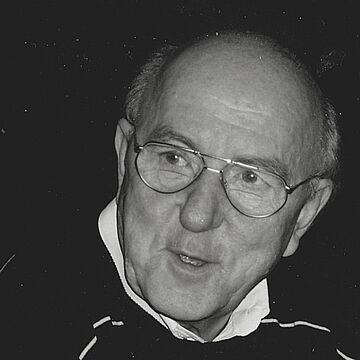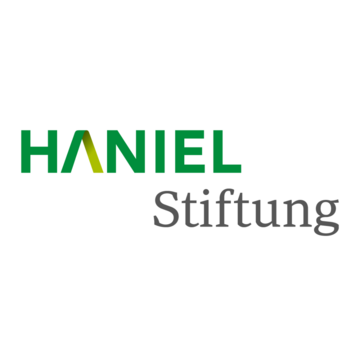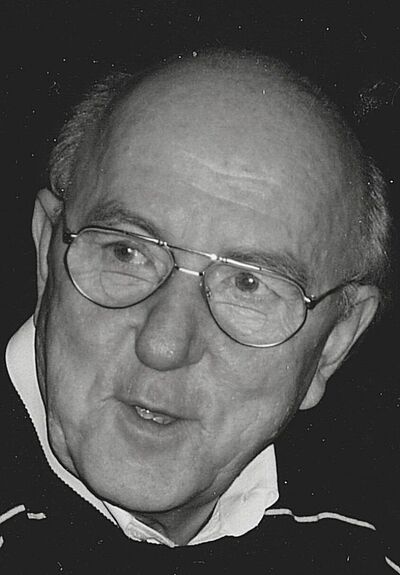
A prize for excellent theses
Key data
In memory of Friedrich Gennheimer, the Haniel Foundation, together with the Ludwigshafen University of Business and Society and the Wine Campus Neustadt, awards the Friedrich Gennheimer Prize for Marketing and the Friedrich Gennheimer Prize for Viticulture, Enology and Wine Marketing.
Funding amount: 2000.00 euros for a Bachelor's thesis / 3000.00 euros for a Master's thesis
Frequency: annually
Donor: Haniel Foundation
Awarding institution: HWG Ludwigshafen
Announcement: HWG Ludwigshafen and Wine Campus Neustadt
Wine Campus contact: Prof. Dr. Laura Ehm

2025
The award ceremony
On October 23, 2025, prizes will be awarded for the third time in the name of Friedrich Gennheimer by the Ludwigshafen University of Business and Society at the Wine Campus Neustadt. You can register for the event via the Ludwigshafen University of Applied Sciences calendar of events.
Nina Elva Laut received a marketing prize for her bachelor's thesis entitled "Sustainability in development cooperation - A comparison of development projects in Cambodia by Japan and the People's Republic of China"
and Noah Laufer for his Bachelor's thesis entitled "Stock market dynamics and political information"
The prize for viticulture, Enology and wine marketing was awarded to Samantha Schäfer for her Bachelor's thesis entitled "Sustainability transformation: end consumer analysis of returnable wine in food retail".
Detailed information on the prize winners and their abstracts can be found further down on this page!
Focus on social responsibility
Application
Today more than ever, companies are faced with the task of combining economic activity with ecological and social responsibility. Expectations of sustainability, transparency and fairness as well as the desire for value-oriented management have increased. Consumers are also increasingly honoring values. Issues such as inclusive communication, diversity and fair working conditions have become success factors that determine credibility and competitiveness. Social aspects are also gaining in importance in the wine industry: certifications, transparency and social commitment are coming more into focus.
Against this backdrop, the Friedrich Gennheimer Prize 2025 honors work that examines social sustainability, social responsibility and value-oriented corporate management in marketing, viticulture, Enology and wine marketing. Prizes will be awarded to works that deal with sustainability aspects and in particular highlight the role of marketing as a driver of social responsibility, social justice and sustainability.
Outstanding Bachelor's and Master's theses from the degree programs of the Ludwigshafen University of Business and Society and the Wine Campus Neustadt can be submitted. Practical work is just as welcome as theoretical papers. Student nominations are made exclusively by the professors. The competition for the Friedrich Gennheimer Prize 2026 will be announced at the beginning of the new year.

Friedrich Wilhelm Gennheimer
About the person
Friedrich Wilhelm Gennheimer was born in 1930 in Neustadt an der Weinstraße as part of the Gennheimer Brothers sparkling wine cellars. His professional career began with a degree in business administration. In 1970, he was offered a teaching position for general business administration at the vocational schools in Speyer. This teaching position was accompanied by an appointment as a civil servant for life. In 1971, he was transferred to the Staatliche Höhere Wirtschaftsfachschule in Ludwigshafen. There, Gennheimer accepted an employment contract, also for business administration. Just one year later, he was appointed "Professor at the University of Applied Sciences" and moved to the Ludwigshafen department of the Rhineland-Palatinate University of Applied Sciences. Gennheimer taught in the fields of marketing, human resources and training. From 1979 to 1987, he also headed the Ludwigshafen department as dean and was responsible for founding the Worms department (now an independent university) and the later East Asia Institute in Ludwigshafen. Gennheimer retired in February 1996, although in the two years that followed he continued to teach the subject of communication and contracting policy at the East Asia Institute in the Department of Business Administration II.
Friedrich Gennheimer died in 2022 and left a will, which is now being administered by Prof. Dr. Siegfried Englert. Englert is one of the co-founders of the Wine Campus Neustadt and a former professor at the East Asia Institute of the Ludwigshafen University of Business and Society. In memory of Gennheimer, the Friedrich Gennheimer Prize was established in spring 2023 together with the Haniel Foundation as the awarding institution.
Photo: private

Working with values
The prize donor
The Haniel Foundation was established in 1988 as a non-profit foundation under private law by Franz Haniel & Cie. GmbH. In line with the self-image of the Haniel family and the Haniel company, the Haniel Foundation pursues its objectives and its mission "Working with values" in two main areas:
- Enkelfähiges Unternehmertum: The Haniel Foundation promotes young entrepreneurial talent. Future leaders in our society and economy. Talented people who drive change. With ideas. With attitude. With the cross-generational understanding of the values of the honorable businessman. We provide these talents with top scholarships. Access to our community. A broad spectrum of excellent opportunities.
- Education as an opportunity: children and young people in a challenging environment deserve fair opportunities. Education opens doors. We undertake support initiatives. Effective programs. Joining forces with partners. And help young people graduate from school and enter the world of work. In responsibility for our home, the Ruhr region.
In trusting cooperation with the Ludwigshafen University of Business and Society
The Ludwigshafen University of Business and Society, together with the East Asia Institute and the Haniel Foundation, has enjoyed a stable cooperation for more than 25 years. The Haniel Foundation has supported German students' stays abroad in China and Japan through the annual awarding of the Haniel Prize at the East Asia Institute. In addition, the Haniel Foundation has sponsored over 70 Chinese scholarship holders in two consecutive scholarship programs who were pursuing a career in the management of an international company and studying at the Ludwigshafen University of Applied Sciences and the East Asia Institute.
It was not least due to this long-standing, trusting partnership that Professor Gennheimer decided to establish the newly created Friedrich Gennheimer Prize together with the Haniel Foundation at his former place of work.


